Nursing the nation back to health
In the Edit interview, nursing alumni talk about their roles and show support for new graduates during the pandemic.
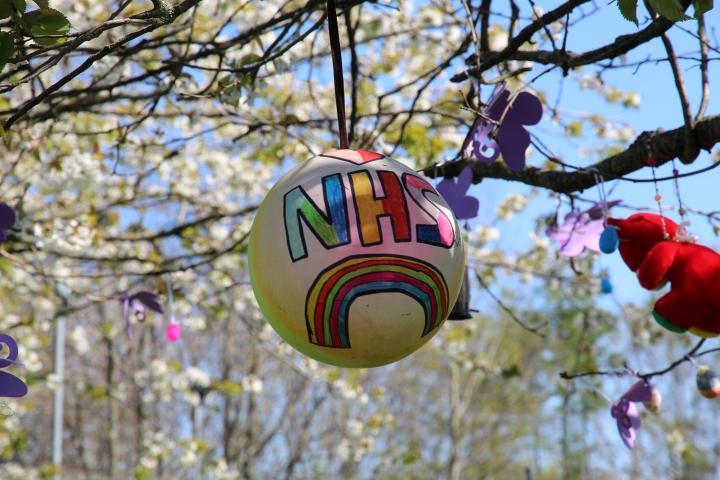
The World Health Organization has designated 2020 the International Year of the Nurse and Midwife. As nurses around the globe work around the clock to help patients with Covid-19, it’s time to fully appreciate the role these vital workers play. Alumni Gearóid Brennan and Alice Thomson talk about the highlights and challenges of being a nurse, the impact of the pandemic on their roles and the advice they’d give to final-year students who are graduating early to join the frontline. And Head of Nursing Studies at the University, Professor Aisha Holloway, sends a good luck message to final-year students.
Good luck to all our graduating nurses
Watch Professor Aisha Holloway's message to final-year students starting out on their careers and offering support during the coronavirus pandemic.
- Video: Professor Aisha Holloway message to final-year student nurses
- Professor Aisha Holloway good luck message to final year nursing students as they prepare to graduate early to join the frontline April 2020.
Gearóid Brennan (MN Clinical Research 2015)
Gearóid is a Clinical Nurse Specialist in Liaison Psychiatry for the NHS and Clinical Fellow in Nursing Studies at the University.
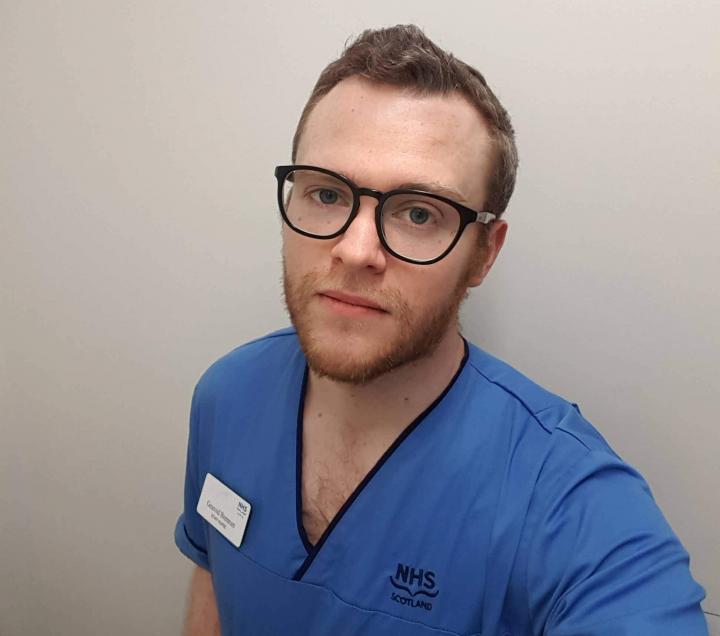
Who or what inspired you to pursue a career in nursing?
I fell into nursing by accident. I worked part time in a caring role for people with learning disabilities while studying for my first degree back home in Ireland. My plan was to go into teaching. It soon became apparent to those around me (but not me!) that I was on the wrong career path. It was when I worked abroad for a year as a teacher that I really missed my caring role. I spoke to my boss at the time, who laughed and said, “I knew this was going to happen, now off to Scotland with you!” I applied, got accepted and never looked back!
I think I was inspired to become a nurse working in that learning disability setting and seeing what experienced colleagues were doing. I learned so much from them in terms of fundamental care but also meeting the whole needs of the person. It was one of the best introductions to nursing I could have asked for. The manager who encouraged me to apply for nursing, Liz McGuinness, remains a nursing hero of mine. She married a no-nonsense, straight to the point approach with warmth and a cracking sense of humour. She really advocated for residents and staff and was never afraid to speak her mind. She is also one of the most qualified nurses I have ever met – she is a learning disability, mental health and adult nurse!
Tell us a little about what your role involves.
I have two roles. Half my week I’m a Clinical Nurse Specialist in Liaison Psychiatry for the NHS. The other half I’m a Clinical Fellow in Nursing Studies here at the University of Edinburgh. My academic role involves the full spectrum of academic duties – undergraduate teaching, dissertation supervision, student support and research. My clinical role involves providing mental health support to accident and emergency (A&E) and toxicology patients. We conduct biopsychosocial psychiatric assessments and develop appropriate management plans. We also provide some outpatient follow-up, delivering brief psychological interventions.
What do you love about your job and why is it important to you?
I say this all the time but it’s no cliché: I love my job! I can honestly say that no two days are the same. One day I’m in A&E assessing someone in acute mental distress, making rapid autonomous decisions. The next I’m teaching clinical skills to undergraduates or writing a draft of some research findings. I’m not part of just one great team: I’m part of two!
My colleagues and I often see people at their most distressed in a very loud and chaotic environment. It’s so important that people can tell their story and feel listened to. Its therapeutic value is so underrated. You can make a massive impact on someone in a very short space of time, and that is very humbling. It’s also very rewarding being relatively autonomous regarding my practice.
It’s so important that student nurses get the absolute best educational experience. They deserve it. The public also deserve it. If I make a mistake with one patient in practice, that is one patient and their family impacted. Get it wrong with 30 students, how many people could be potentially harmed? On the other side, get it right and it’s humbling to think how many lives you can positively impact as an academic.
Watch Gearóid's message to nursing graduates
- Video: Gearóid Brennan alumnus nurse message to final-year nursing studies students
- Video message by alumnus nurse Gearóid Brennan to final-year nursing students April 2020.
What are the challenges and how do you tackle these?
There are so many challenges in both my roles. I suppose that’s what makes them interesting. Being a mental health nurse in a general hospital can be a challenge. People can have a preconceived perception of what you can do, which often differs from the reality. Sometimes people simply don’t understand what it is we do, so you have to manage people’s expectations and be very clear on your role but also be willing to understand other people’s challenges and opinions.
The government target of seeing and treating people within four hours in A&E is another challenge. That also applies if someone requires a mental health assessment. I have to balance the high clinical demands of a very busy, hard-working A&E department with the best interests of the person I am assessing. Mental health assessment is complex and to make the best decision it often requires speaking to other teams in order to execute a safe plan and that sometimes takes a bit of time. With that, it leaves a very short period to build a therapeutic relationship with the person. You need to build trust rapidly so you can have an honest and empathic conversation about very difficult topics including suicide. Practicing autonomously and taking a lot of positive risks with people can sometimes be scary. However, I work in an inspiring team of other nurse specialists and psychiatrists in the Department of Psychological Medicine. There is not a single colleague I could not go to and ask for advice and support.
Being an early career academic comes with another set of challenges. I’ve had a lot of support transitioning to the role, including individual mentorship from my colleague Dr Elaine Haycock-Stuart. My PhD supervisor Dr Rosie Stenhouse has been great too. I think when you have been a PhD student in the University, people make a lot of assumptions about what you know around university processes, teaching and learning, etc. So again, it’s about being clear in your role and asking for clarification when you’re unsure.
Juggling the split between NHS and University also has its quirks. It can feel like having two full-time roles instead of two part-time ones. It only works because of supportive colleagues and line managers. Both see the advantage in the other, so shout out to Professor Aisha Holloway and Joyce Follan in the NHS.
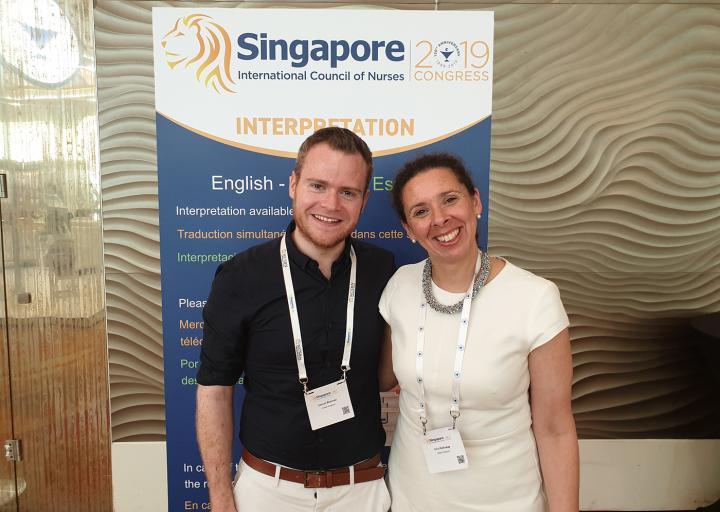
How is the coronavirus changing this daily routine? What has been the impact of the pandemic on nursing?
So with the gyms closed and the need to reduce social contact, I’ve bought a bike and I’m cycling everywhere! I never thought I would be a cyclist. Two weeks in and I’m still petrified and there aren’t even that many cars around but I’m getting my exercise in.
In terms of work, people are and will continue to become mentally unwell, much as babies will still be born. So it’s somewhat business as usual. Mental health nurses work with high degrees of risk and uncertainty anyway, so there’s a sense of keeping calm and carrying on. My colleagues have been busy setting up informal staff supports and making ourselves available for colleagues in other specialities who are dealing directly with Covid-19. We’ve started ‘home working’ in order to comply with social distancing. I’ve found this really difficult. It’s a close-knit team of nursing and medical staff and I miss not seeing them.
My University work has changed exponentially! We had to rapidly move our teaching online. There’s uncertainty about the foreseeable and how we best provide our students with the high-quality educational experience they deserve. The amount of work that has gone on behind the scenes is unquantifiable. In lots of ways, I feel majorly unproductive and ineffective as we adapt to new ways of working. Though I’m loving our virtual coffee catch-ups!
The country is incredibly proud of the effort healthcare workers are making during this time. How does this make you feel?
I have really mixed feelings about it. The country should be rightly proud of the NHS. Not just now, but always. I know it’s not perfect but coming from a country where we pay for a lot of our healthcare and don’t have a lot to show for it, I think the NHS is phenomenal. Just pausing and thinking about all the people it sees and treats on a daily basis in normal times. All free at the point of access. It’s such a precious thing. I think the pandemic has really highlighted this. NHS staff work hard day in, day out. But people have moved mountains to prepare for Covid-19 and have gone even further above and beyond than normal. To have the public to acknowledge that is very emotional.
On the other hand, some of the language around it is problematic. Particularly the ‘hero’ and ‘war’ discourse. ‘Unprecedented times’ has become a line to shut down debate and absolve decisions from scrutiny. The use of ‘war’ language really concerns me. Such language is violent – literally and symbolically. I wish people would stop it. We are setting ourselves up to fail by engaging in this sort of language. An inevitable consequence of war is physical and psychological trauma. We know that veterans have felt abandoned by society and I fear there will be a generation of healthcare workers who may feel the same in the aftermath. I really hope the public will stay with us. If leaders want to engage in this sort of discourse then they need to walk the walk and not just talk the talk – that means ring-fenced funding for NHS staff support.
People are talking about first and second waves. There’s a third wave that’s going to involve picking up the pieces and helping people to make sense of what’s happened, while at the same time processing it for ourselves. I expect to see an increase in mental distress, health anxiety and substance misuse. Mental health is directly impacted by social circumstances and already we have seen people presenting as a result of losing their job or other Covid19-related stressors. So we need the public to remember this in a couple of months’ time and advocate for us so we have the resources we need to do the job we really want to.
As an experienced nurse, what would you say to recent nursing graduates and final-year students who are graduating early to join the frontline?
Our final-year students in Nursing Studies have been standout. I’m so proud of them. They’re the first cohort I’ve taught from first to final year, so I’m not going to lie – I have a soft spot for the group.
Their approach to the Covid-19 disruption proves what fantastic nurses they are. They’re intelligent, can think from themselves, are not afraid to ask difficult questions, are pragmatic and mature. They support each other and have a positive, affirming attitude. All qualities I want in a registered nurse caring for me. I cannot wait to call them colleagues in the near future.
I hope that they would never be afraid to ask for help. People prefer working with someone who says, “I don’t know how, can you show me?” rather than someone who blags it and ends up doing harm. I would also say trust your gut – it’s never far wrong. Remain curious and keep asking, “why?” I remember how scared I was in my first shift and indeed for a couple of months as a registered nurse. It won’t be just you – so keep in touch with each other and be there as you always have been for each other. Take your days off and take your breaks – you cannot pour from an empty cup. Finally, above all else, be kind!
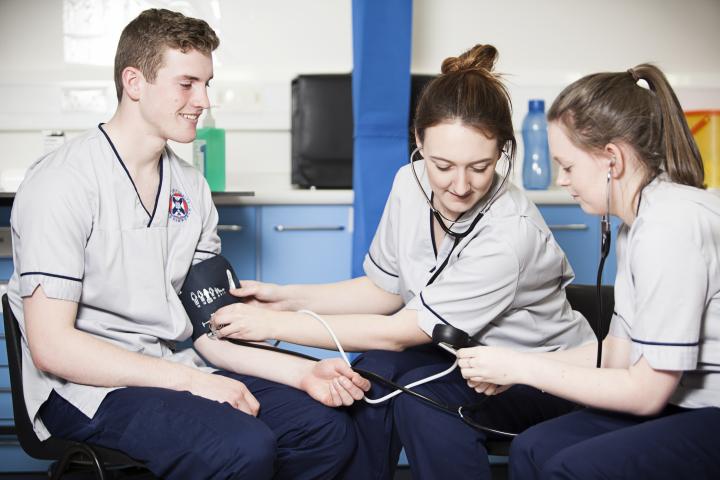
For nurses around the country this will be a stressful time. How do you relax and look after yourself? What tips would you offer to fellow nurses and healthcare workers?
I think being kind to yourself. It is easier said than done. But you can only do the very best with the resources you have available. I think focusing on what you can control helps. I admit I have been overwhelmed by the information and coverage on social media. It’s so hard not to get lost down the rabbit hole, so I think controlling what you are reading and stepping away from it if it becomes too much is important. I think so much anxiety is derived from the uncertainty of the situation, so focusing on what is within our gift to control can help in remaining grounded. I also think speaking to yourself as you would your friend; gently and empathically. Some of the relaxation apps out there are fantastic and I use them. I’ve been keeping in regular touch with loved ones. I love baking and find it so relaxing. The end product does mean I probably need to keep cycling.
What advice would you give to the public to help support nurses and medical staff during the coronavirus outbreak?
STAY AT HOME! Play your role in flattening the curve and make our workload less. I appreciate it is not easy and absolutely people will be cracking up. But please, stick with it! The more we do, the sooner we can return to normal.
Please don’t forget us when this is over. Healthcare workers are going to be experiencing a lot of moral injury. They are only human too and need to be supported. To those who don’t work in healthcare but have a loved one who does – please let them talk about their experiences and not shut it down. Some say we live in a society that has become desensitised to violence. However, on an individual level, I think we are poor at tolerating distress. People try and shut it down. It comes from a place of love and protection, not wanting to see someone you care for distressed but we have to hear people’s stories, people need to feel what they are feeling and that rightly needs to be validated. People will probably find it hard to keep work at work. I know it can be difficult to be kind to someone when they are moody or irritable, but it’s probably not you. So please cut them some slack this time around.
What are your hopes for the future of nursing?
Firstly, I hope that the good in this pandemic might be that it inspires a generation to consider nursing as a career. You get the transferable skills of a United Nations diplomat and you can also travel just as much as one too. It is honestly one of the best careers you will ever have and there are so many areas and roles you can occupy with it.
I hope in the future when a health question is asked, the response from people and government will be, “Why not nursing?” For that to happen, the profession needs to value itself more and stop referring to themselves as “just nurses”. We’re our own worst enemy. How can we expect wider society to value us when we don’t value ourselves? With Covid-19, the concept of staff wellbeing has entered the public domain and I hope it stays around. We are only human too and there needs to be more compassion shown, especially when things go wrong. Often when they do, it’s not that the nurse was uncaring but more that there weren’t enough registered nurses around.
I hope that nurses will utilise our captive audience to highlight these challenges but also the opportunities our work provides. That will mean nurses need to acquire political astuteness. Everything is political including the NHS and we cannot shy away from that. We make up around 60 per cent of the total global health workforce and we need to start using our voice to shape the agenda. We know that not only the number, but education level of registered nurses directly impacts on every patient outcome including mortality and morbidity. We also know there are links between these staffing ratios, nurses’ working conditions and wellbeing, and again these all impact on patient outcomes. We need to shout from the rooftops about having enough degree-educated registered nurses – we’re not an expense but an indisputable investment in the nation’s health.
People are talking about activities and people they miss during this time, what is the first thing you would like to do when the lockdown and social distancing measures are lifted?
I will hopefully submit my PhD thesis and have a celebration. I’m planning a long hike in the Pentlands and never taking that privilege for granted again. There are some people who are well overdue a big hug! I think a holiday is definitely in order. In all honesty, I can’t wait for the simple pleasure of spending a lazy Saturday trailing around our beautiful city and enjoying the delights of all the different cafés and great places to eat.
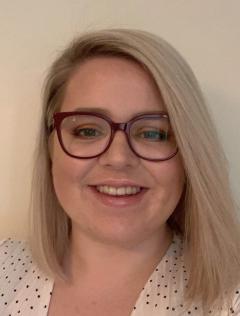
Alice Thomson (Bachelor of Nursing (Hons) 2018)
Alice is a Staff Nurse for the NHS. She is also studying part time for a Masters in Global Health and is a Research Assistant on the Nursing Now global campaign at the University.
Who or what inspired you to become a nurse?
I don’t think I ever had a ‘lightbulb moment’ about wanting to become a nurse, it just always seemed to be something I had wanted to do. I enjoy working closely with people and having a positive impact on people’s lives and in nursing I am able to do that on every shift.
What do you love about your job and why is it important to you?
The one thing I love about my job, as cliché as it sounds, is getting to spend times with the patients and listening to their stories. I feel that when you get time to sit with the patient and get to know them you realise the impact, be it big or small, you are having on their recovery process and how thankful they are for the little things you do for them.
What are the challenges and how do you tackle these?
I feel that within the nursing profession the biggest challenge, I find, is that it is constantly changing. However, these are changes that you know will be beneficial in the long run, as it means that we are able to adapt with the times and the new tests we face. This can also lead to some challenging and confusing times on the wards when new paperwork or protocol is brought in. Due to this you just have to be willing to constantly learn on the job and adapt your practice.
Tell us about a typical day for a nurse.
This is a question I feel all nurses get asked a lot and the truth is that every day is different. Also, as I work for the Nurse Bank, I am often working on multiple different wards in one week. Depending on the specialty the day can differ massively. You come into work for the start of your shift and you never really know what the handover will bring. Of course, all nurses will have their own wee routine of jobs that have to be done like medications and observations that are done at multiple times throughout the day as well as helping patients with daily activities such as their washes and meals. Yet, it can take one little thing and your whole day can change in an instant. As long as you get to the end of the day knowing that you have done everything you could for your patients, that’s the main thing. So, I feel you just have to go into work being ready for anything that day throws at you.
How is the coronavirus changing this daily routine? What has been the impact of the pandemic on nursing?
As I now work on the Nurse Bank, I feel I’ve seen the impact of the pandemic from a few different angles. The main thing that I noticed in the beginning, as we didn’t know what to expect, was the fear of the unknown. Where I work there’s been a big shift in the way we are working. The hospital has come together. Nurses, doctors, allied health professionals, everyone, are all getting moved around the hospital to staff Covid-19 wards and fill in the gaps for sickness. It has been amazing to see everyone working together as part of the NHS team.
Practice is constantly being adapted with new PPE (personal protective equipment) regulations and new staffing ratios constantly changing. There seems to be ongoing training as everyone is doing their bit to make sure the hospital keeps running as normal as possible. At the end of the day we know this isn’t going to last forever and the more we work together as a team the easier we can make this time for everyone.
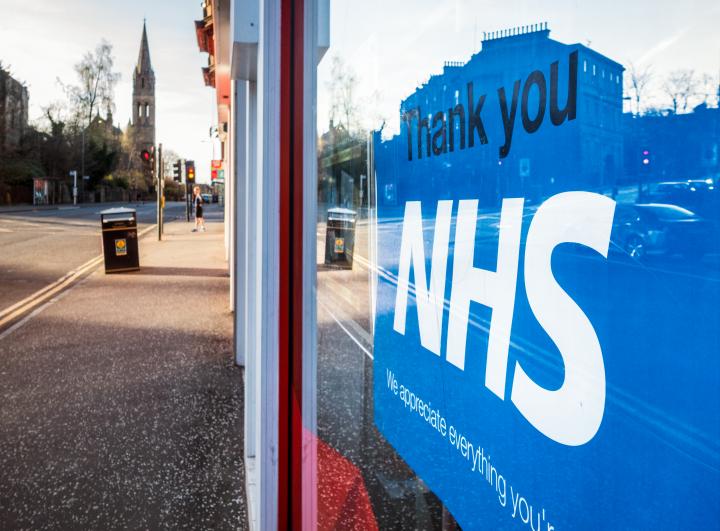
The country is incredibly proud of the effort healthcare workers are making during this time. How does this make you feel?
The reaction of the public has been so heart-warming. As much as I am aware that we are doing our jobs, it is making this troubling time that little bit easier to see that the public are behind us and cheering us on. I feel that we are getting the recognition for the amazing jobs that the NHS does on a daily basis, and even more so at this time in particular.
As an experienced nurse, what would you say to recent nursing graduates and final-year students who are graduating early to join the frontline?
The jump from student nurse to staff nurse is something that we all find nerve racking, so I can only imagine what is going through the heads of those that are joining us on the frontline at this time. One of the main things to remember in this transition is never be afraid to ask for help. You won’t know everything as soon as you step out in the royal blue uniform and no one will expect you to. If you’re not comfortable doing something or want something explained by a senior member of staff just say and I am sure plenty of people will be willing to help and teach you. We were all you at one point and especially now more than ever we are all learning and adapting on the job.
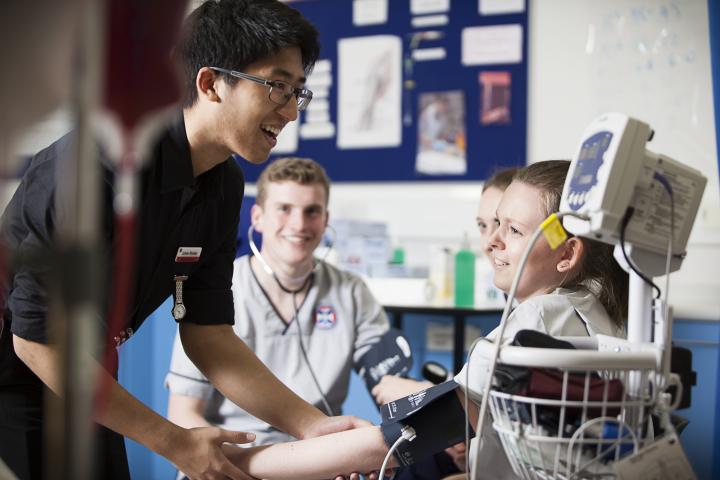
For nurses around the country this will be a stressful time. How do you relax and look after yourself? What tips would you offer to fellow nurses and healthcare workers?
One thing I would always say is not to bottle up how you are feeling about the situation. Speak to people you work with or your friends from university, you will find that they have probably been having the same feelings. Also, take time to yourself to decompress after a long shift. This is different for everyone, like watching your favourite TV show, reading a book or whatever you personally find relaxing. For me, I enjoy coming home, putting some comfy clothes on and switching off from work with a good film.
What advice would you give to the public to help support nurses and medical staff during the outbreak?
The main thing I would say is please continue to follow the government guidelines and stay home when possible. I know it may not feel like it but staying at home is the most important thing you can do to help the NHS cope with this virus. We know this is a difficult time for everyone but the more we listen and do what we can the easier this will be for all of us. Keep in contact with your family and friends as best you can over social media or phone, check in on them and see how they are finding things. Remember we are all in this fight together.
What are your hopes for the future of nursing?
I hope that from all of this hardship we are currently facing that nursing continues to get recognised for all the work that is done and that this inspires people to join the profession to help make a difference. I feel that from this we have learnt a lot, and I think that this will change nursing as a whole and will bring us together to show us the strength we have as a profession.
Find out more
Nursing Studies at Edinburgh
COVID-19 microsite
Photos courtesy of Sam Sills, Getty/Serge Cornu/George Clerk, Alice Thomson and Gearóid Brennan. Photos of nursing students at the University taken before the coronavirus pandemic.

